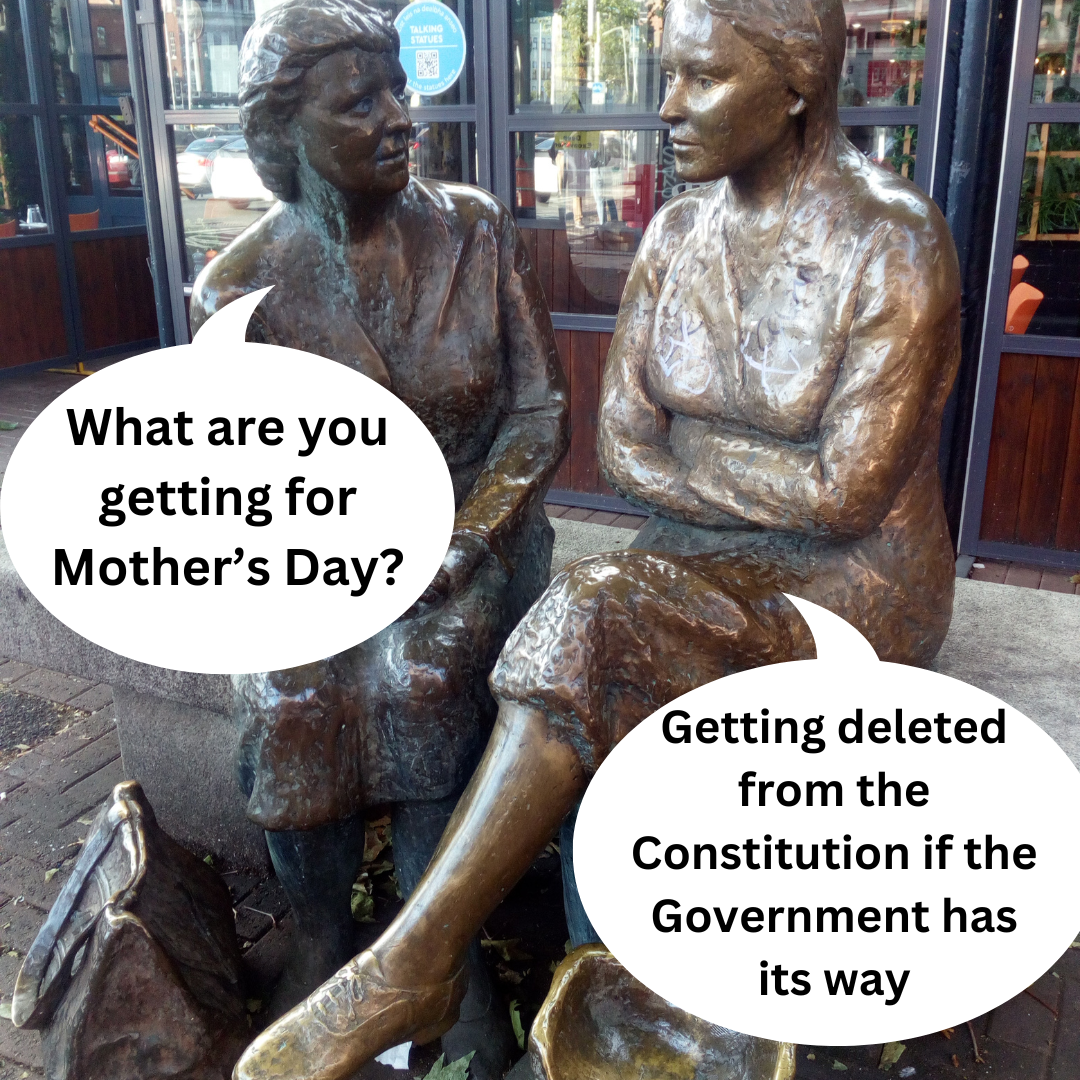The Care Amendment/40th Amendment
- Many women are very concerned about the proposed deletion of Article 41.2 because it has been of value to mothers and will be cited in an appeal to the Supreme Court in April by a mother who is seeking the full carer’s allowance, without it being means tested. She is unable to work as she cares fulltime for her severely disabled son.
- Article 41.2 does not say that a woman’s place is in the home. Ms Justice Marie Baker, chair of the Electoral Commission, has made this quite clear. What Art 41.2.2 does say is that the State will try to ensure that mothers, (not women), are able to stay at home and not be forced out to work through the need to earn money.
- This is clearly a very worthwhile “direct obligation” on the State to protect mothers, as the latest survey shows that when asked if they had the option, and money was not an issue, 69% of mothers with children under 18 would prefer to be at home.
- Art 41.2 was also used to protect mothers in the Murphy case of 1980 when the Supreme Court specifically relied on this protection as part of its reasoning in forcing the State to introduce a pro-family tax regime and to stop a couple from being taxed unfairly.
- Art 41.2 has also had a role in the fact that Child Benefit is paid to mothers and in ensuring that husbands with sufficient money cannot demand that mothers be obliged to work outside the home when they want to look after their children.
- Not only is Art 41.2 a benefit to mothers but as Senator McDowell told the Seanad:
“If we get to the point where there is a legislative basis for working from home, the present wording of Article 41.2 would give a strong argument to anybody who says they were being forced by their employer, and particularly by the State, to work in an office unreasonably when economic difficulty is imposed on them in looking after the children of the family.”
- In addition, the former government’s Special Rapporteur on Child Protection, Geoffrey Shannon, who is now a judge has said that Ireland is
“…unique in having such a constitutional clause, and also in its type of maintenance regime in the case of marriage breakdown. This guarantees lifelong financial support for a dependent spouse.”
He said that the removal of the “woman’s place in the home” clause from the Irish Constitution could affect maintenance payments in family law cases.
“’A dependent spouse fares better in Ireland than in virtually any other jurisdiction in the world, and that’s due to this lifelong obligation. It is a safety net or a protective mechanism for the spouse who acts as homemaker,’” he has said, adding that
“’In other countries, a time is reached after which you cannot seek furthermaintenance. There is no such thing as a ‘clean break’ here, as far as maintenance is concerned. You can always return for further support if you are a dependent spouse. That protects children as well.’”
- Senator Michael McDowell, a former Attorney General and Minister for Justice, has produced a very helpful leaflet which outlines the facts about the two referenda which can be found here. His opinion pieces on the proposed referenda are also worth reading.
- These referenda were rushed through the Oireachtas without any pre-legislative scrutiny, no amendments were accepted and Minister Roderic O’Gorman’s department has refused access to all 64 pages of notes and minutes discussing the consequences of the amendments including tax laws, social welfare laws, pension laws, allocation of family assets, alimony and allowance including the laws concerning family reunification for asylum seekers.
- FLAC, the Free Legal Advice Centres has said has described the wording on care as “a missed opportunity for the rights of women, carers, older people, and people with disabilities”. It added that this was making care “the private responsibility of unpaid family members without any guarantee of State support”.
- This was echoed by the Irish Council for Civil Liberties (ICCL and the Independent Living Movement Ireland (ILMI) which said that the wording “fell short” of what care organisations want. The Equality Not Care group pointed out that ““We have a Disability Act 2005 that is still not fully commenced, already forcing parents into court for a Needs Assessment for their children”.
- If this referendum is passed 98% of carers will still be women but our contribution and the “direct obligation” on the State to support mothers providing it in the home will be gone. This point has been made by many commentators, including Senator Tom Clonan in this recent RTE1 Radio interview and Irish Independent editor Regina Lavelle in this newspaper article .

The Family Amendment/39th Amendment
- The second referendum, the “family” amendment, is about extending the Constitutional meaning of family to what are termed “other durable relationships”. Since the Government can’t or won’t define what it means by this, it will be left up to the courts – through expensive litigation – to decide what a “durable relationship” is.
- Since a marriage can only be ended with a court order with proper provision made for the spouses and children what will happen when a “durable relationship” breaks down? No such requirement will exist in relation to parties to a “family” based on “other durable relationships”. What effect will this have on existing marriages, children, inheritance rights and so on?


